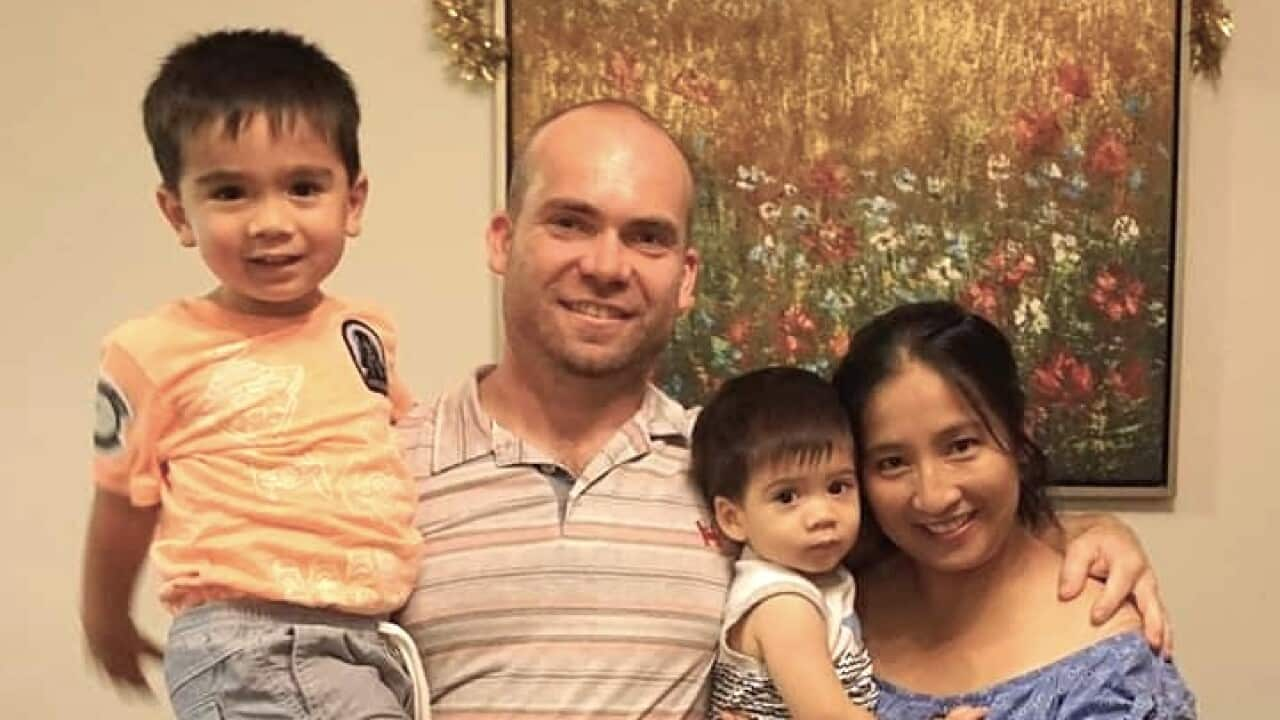Ressie Davis always wanted to be a mother. She knew it would be challenging, but she didn’t realise it would be that hard. She expected her baby to be like other babies – asleep most of the day, and easily calmed by the milk from her breast and a warm cuddle. What she didn’t expect was that there would be a struggle that would go hand-in-hand with settling her child, or that her weariness would lead to debilitating exhaustion. What she didn't realise right away was that she wasn't just tired, she was depressed.
The 36-year old mother-of-two was diagnosed with postnatal depression several months after the birth of her first child, Ty, whom she co-slept with during the first few months of his life. Co-sleeping and exhaustion
Co-sleeping and exhaustion

Ms Davis with Ty at 8-weeks old. Source: Ressie Davis
Australian culture frowns upon co-sleeping; however, this practice is the norm among Filipino parents. While taking the necessary precautions, Filipinos see co-sleeping as practical and safer than having children sleep in another room. Ms Davis shares that her mother co-slept with her and her brother as well.
"[Babies] need to be protected so it was what they did when they were back in the Philippines," the Sydneysider says, "and I guess that made me feel less guilty about co-sleeping with my child. So there were things that I let go of...in Western culture." Not only did she let go of the Western push not to co-sleep, she let go of sleep altogether.
Not only did she let go of the Western push not to co-sleep, she let go of sleep altogether.

Ressie as a child with her mum. Her mum passed away a few months after her son's first birthday. Source: Ressie Davis
Ms Davis admits that while she was happy being near her child, she was exhausted. Always feeling alert with every breath and movement, Ms Davis never got a good night's rest. It was easier in the beginning, of course, when small hands and feet hardly made the sheets move; but as he grew, so did the strength of his kicks. And while the kicking was bad enough, Ty was consistently restless and she just didn't know how to make things better. It would even get to the point that the two had to get out of bed, and with Ty in a pram, Ms Davis would circle the neighbourhood just to get the equally-exhausted bub to sleep.
She took all of this in on her own. Her husband Joel worked full-time, and she was a stay-at-home mum then. Motherhood was supposed to come naturally. It was supposed to be joyous. Why then was she feeling incapable, and almost catatonic? She was anxious about going back to work after her maternity leave, and she thought that she wasn't being a good mum even when she was home.
"I had this persona that I was always maternal. I put pressure on myself to live up to that belief. I [was always maternal to my younger] cousins or nieces and nephews," she shares, "But it’s very different when it’s your own."
She was ashamed to confide in her family and friends. She was embarrassed to tell her husband, who was now sleeping in the other room due to being afraid of rolling on their child if he slept in the same bed.
"[Joel and I] lost a lot of intimacy. We used to always talk about what our day was like. We lost [that] for a whole year. He wasn’t sure what I was thinking or feeling, and I didn’t share a lot of my feelings with him either," she shares. Seeking help
Seeking help

Ms Davis admits that she lost the intimacy she used to have with her husband. Source: Ressie Davis
While Ms Davis didn't share her feelings with Joel, the community nurses immediately caught on to how Ms Davis was feeling. The nurses recommended that Ms Davis seek help for herself, her son and her relationship with her husband.
A referral was made for the family to Possum Cottage in Southeastern Sydney, a clinic that provides assistance when it comes to sleeping, settling, breastfeeding and nutritional challenges, as well as postnatal anxiety and depression. Possum Cottage also made a referral for the family to Karitane, a centre with residential stays offering holistic and intensive programs to help parents adjust to parenthood.
"They tried to settle my child and saw that it was really hard. I’m glad they saw it from my perspective - that my child was really hard to settle," she shares, "I felt understood."
She felt understood, and her child's sleeping pattern drastically improved. She shares, "He was almost like a different child. It was wonderful."
Although everything was wonderful with her child's sleep, she and her husband still had to learn how to communicate. Ms Davis admits that while she was going through things by herself, her husband was waiting for her to let him in.
"I thought, I was the one at home, I should've been able to do it on my own. But little did I know that he was more than willing to help me out," she shares, adding "we're a team."
And as a team, they faced and resolved the same sleeping challenges with their second child, Lenny. It was still difficult, but they made it through together.
"[Our partners are] just figuring out parenthood as much as we are" she shares. If you or someone you know has symptoms of postnatal depression, please seek help through any of the following organisations:
If you or someone you know has symptoms of postnatal depression, please seek help through any of the following organisations:

The Davis family Source: Ressie Davis
- - 1300 726 306
- - 1300 224 636
- - 1800 882 436
ALSO READ


